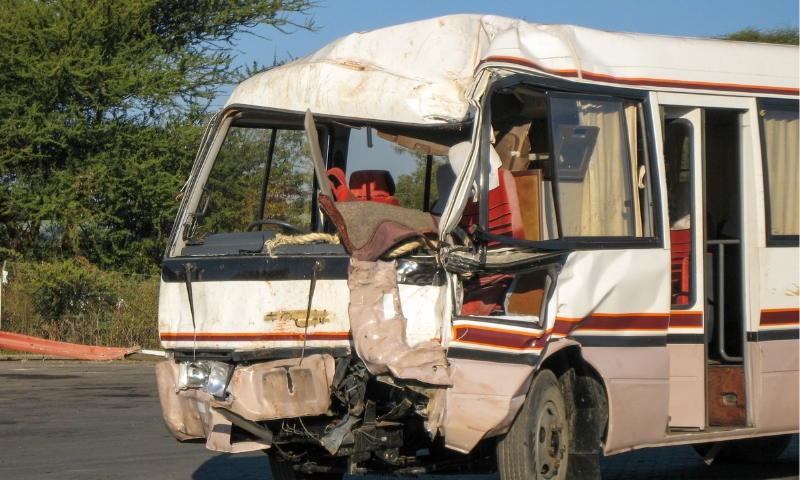
Bus accidents can have devastating consequences, impacting victims physically, emotionally, and financially. Understanding your rights and legal options after such a traumatic event is crucial for securing justice and compensation.
Whether you were a passenger, pedestrian, or another driver involved, navigating the complexities of filing a lawsuit requires clarity and informed decision-making.
In the aftermath of a bus accident, immediate actions such as seeking medical attention and documenting the scene are paramount. However, beyond these initial steps lies a legal landscape that demands careful navigation.
This blog explores the essential aspects of pursuing a lawsuit after a bus accident, from understanding liability to the intricacies of the legal process. By shedding light on these critical topics, we aim to empower you with the knowledge needed to protect your rights effectively.
Immediate Steps After a Bus Accident
Immediately after a bus accident, taking swift and decisive action can significantly impact your well-being and legal standing:
- Ensure Safety and Seek Medical Attention: Your safety and health should be the top priority. Check yourself and others for injuries. Call emergency services for medical assistance if needed.
- Document the Accident Scene: Take photos and videos of the accident scene from multiple angles. Include close-ups of vehicle damage, road conditions, and any visible injuries.
- Collect Evidence: Gather relevant information such as bus driver information, insurance details, and contact information from witnesses.
- Notify Authorities: Report the accident to local law enforcement or transit authorities. Ensure an official accident report is filed.
- Gather Witness Information: Obtain names and contact information from any witnesses who saw the accident occur.
Understanding Liability in Bus Accidents
Understanding liability in bus accidents involves identifying responsible parties and establishing negligence:
- Types of Parties Potentially Liable: Liability in bus accidents can extend to various parties, including the bus driver, the bus company or operator, maintenance contractors, or even manufacturers in cases involving defective parts.
- Establishing Negligence: Proving negligence is crucial in determining liability. This involves showing that the responsible party owed a duty of care to passengers and others on the road, breached that duty through actions or negligence, and caused harm or injury as a result.
- Bus Driver Responsibility: Bus drivers are expected to adhere to traffic laws, operate vehicles safely, and follow company protocols. Violations of these responsibilities can contribute to establishing negligence.
- Company Liability: Bus companies can be held liable for accidents caused by inadequate training, poor maintenance, or negligence in hiring or supervising drivers.
- Legal Considerations: Seek legal advice to navigate complex liability issues and ensure your rights are protected when pursuing compensation after a bus accident.
Filing a Lawsuit
Filing a lawsuit after a bus accident involves several critical steps and documentation:
- Consultation with Personal Injury Attorneys: Seek guidance from experienced personal injury attorneys to evaluate your case and understand legal options.
- Initial Assessment: Assess the circumstances surrounding the bus accident, including gathering police reports, medical records, witness statements, and any documentation related to the accident.
- Statute of Limitations: Be aware of the statute of limitations, which varies by state, to ensure timely filing of the lawsuit.
- Complaint Filing: Prepare and file a formal complaint outlining the details of the accident, injuries sustained, and the basis for negligence or liability against the responsible parties.
- Discovery Phase: Engage in the discovery process, where both parties exchange relevant information and evidence to build their cases.
- Negotiation and Settlement: Explore opportunities for negotiation and settlement discussions with the defendant or their insurance representatives.
- Trial Preparation: If a settlement cannot be reached, prepare for trial by organizing evidence, identifying witnesses, and developing a legal strategy with your attorneys.
Legal Process and Timeline
Understanding the legal process and timeline in bus accident lawsuits is crucial for those seeking compensation:
- Initial Consultation: Begin with a consultation with personal injury attorneys to assess the viability of your case and explore legal options.
- Pre-Litigation Phase: During this phase, attorneys investigate the accident, gather evidence, and assess liability.
- Filing the Lawsuit: Formalize your claim by filing a complaint in the appropriate court, detailing the incident, injuries, and damages.
- Discovery: Both parties exchange information, including witness statements, expert opinions, and other evidence relevant to the case.
- Mediation and Negotiation: Attempt to reach a settlement through mediation or negotiation to avoid a trial.
- Trial Preparation: If a settlement is not reached, prepare for trial, where evidence will be presented, witnesses questioned, and arguments made.
- Trial and Verdict: The trial concludes with a verdict determining liability and, if applicable, the amount of compensation awarded.
Compensation and Damages
Understanding compensation and damages in bus accident lawsuits is essential for securing financial recovery:
Types of Compensation:
- Medical Expenses: Covers costs related to hospitalization, surgeries, medications, and ongoing treatments.
- Lost Wages: Reimbursement for income lost due to injury, including future earnings if unable to work.
- Pain and Suffering: Compensation for physical pain, emotional distress, and reduced quality of life.
Factors Influencing Compensation:
- Severity of Injuries: The extent of injuries and their impact on daily life and future capabilities.
- Negligence and Liability: Determination of fault and responsibility for the accident.
- Evidence and Documentation: Strength and clarity of evidence, including medical records, witness statements, and expert testimonies.
- Legal Representation: Effectiveness of legal representation in advocating for maximum compensation.
Choosing a Bus Accident Lawyer
Selecting the right bus accident lawyer can significantly impact the outcome of your case:
Importance of Legal Representation:
- Expertise in Bus Accident Laws: Experience and specialization in handling bus accident cases, including knowledge of transportation regulations.
- Negotiation Skills: Ability to negotiate with insurance companies and defendants to secure fair compensation.
- Courtroom Experience: Track record of success in litigation, if your case goes to trial.
Criteria for Selecting a Qualified Lawyer:
- Experience: Prior experience specifically with bus accident cases, and a proven history of successful outcomes.
- Reputation: Positive reviews, testimonials, and references from past clients.
- Communication: Clear communication and accessibility throughout the legal process.
- Fee Structure: Transparent fee arrangements, typically on a contingency basis, ensure alignment with your financial interests.
- Resources: Access to necessary resources such as expert witnesses and investigative teams.
Choosing a skilled personal injury attorney who specializes in bus accident cases ensures you have the best possible chance of obtaining maximum compensation and justice for your injuries.
Navigating a bus accident lawsuit requires diligence and expert legal guidance. By understanding the process, seeking timely medical care, and securing legal representation, you enhance your chances of obtaining rightful compensation and moving forward with confidence.




